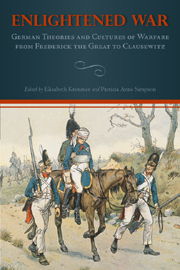Book contents
- Frontmatter
- Contents
- List of Illustrations
- Acknowledgments
- Introduction: Enlightened Warfare in Eighteenth-Century Germany
- Part I War and Enlightenment
- 1 The Point of Recognition: Enemy, Neighbor, and Next of Kin in the Era of Frederick the Great
- 2 Writing War and the Aesthetics of Political Literature in the 1790s: Daniel Jenisch's (Un)timely Seven Years' War Epic Borussias
- Part II Cultures of War in Classicism and Romanticism
- Part III War and Gender
- Part IV War and Theory
- Bibliography
- Notes on the Contributors
- Index
2 - Writing War and the Aesthetics of Political Literature in the 1790s: Daniel Jenisch's (Un)timely Seven Years' War Epic Borussias
from Part I - War and Enlightenment
Published online by Cambridge University Press: 05 February 2013
- Frontmatter
- Contents
- List of Illustrations
- Acknowledgments
- Introduction: Enlightened Warfare in Eighteenth-Century Germany
- Part I War and Enlightenment
- 1 The Point of Recognition: Enemy, Neighbor, and Next of Kin in the Era of Frederick the Great
- 2 Writing War and the Aesthetics of Political Literature in the 1790s: Daniel Jenisch's (Un)timely Seven Years' War Epic Borussias
- Part II Cultures of War in Classicism and Romanticism
- Part III War and Gender
- Part IV War and Theory
- Bibliography
- Notes on the Contributors
- Index
Summary
IN 1794 DANIEL JENISCH, a proponent of the late Enlightenment who is largely unknown today, published what must be called one of the most unique books of eighteenth-century German literature. A versatile writer, Jenisch was well acquainted with many respected authors but by and large had remained at the margins of the literary republic. In a time of political crisis, with a literary market dominated by topical, short-lived news in broadsheets, pamphlets, and newspapers, Jenisch offered readers a two-volume epic in twelve cantos entitled Borussias. The text is not only the longest and most elaborate literary treatment of the Seven Years' War (1756–63) in eighteenth-century German literature, but proves on closer examination to be highly complex and innovative. Among other features, it combines detailed battle scenes with long lamentations for the victims of war; it contrasts a king's soliloquy on suicide with a dying soldier's heavenly revelations about the true nature of the universe; and it juxtaposes reports of plots against Frederick with a eulogy of his political achievements. Past interpretations of the text have found it inconclusive. In contrast, this chapter maintains that the epic constructs a coherent argument: to Jenisch, the Seven Years' War served as a Trojan Horse that allowed him to participate in the 1790s debate on Europe's political future despite censorship and the anti-Enlightenment campaign initiated by the Prussian government under Johann Christoph von Wöllner.
- Type
- Chapter
- Information
- Enlightened WarGerman Theories and Cultures of Warfare from Frederick the Great to Clausewitz, pp. 41 - 72Publisher: Boydell & BrewerPrint publication year: 2011

